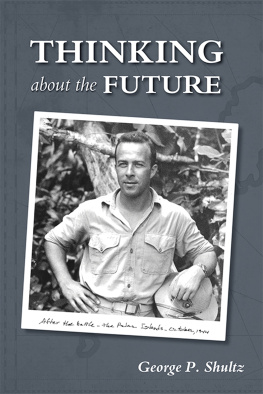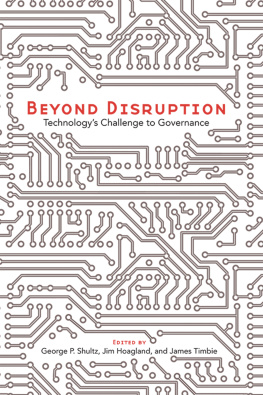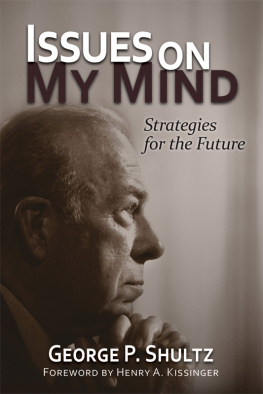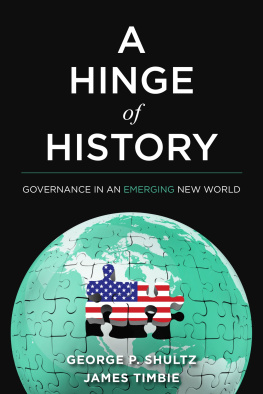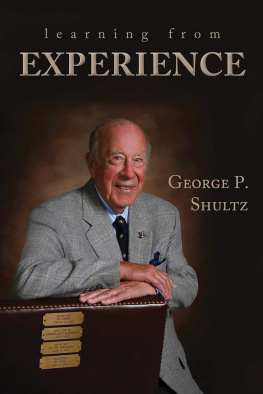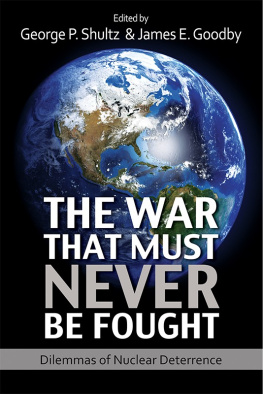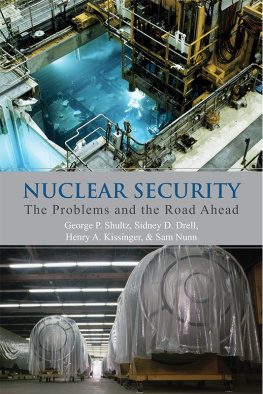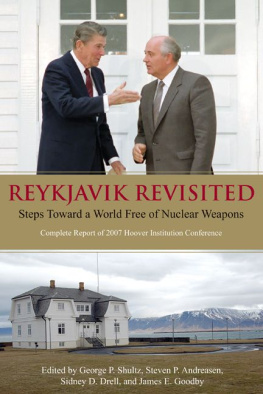PRAISE FOR
Thinking about the Future
From the summits of his accrued experience and wisdom, George Shultz reflects upon the future. He shares pragmatic reflections complemented by clusters of life experiences to guide his readers toward safe trails as they confront the accumulated challenges of our democracies. Shultzs main concern is governance over diversity in an age of transparency. The compass that he leaves us with integrates trust, credibility, and truth, the pillars of accountability. This is a must-read book for the champions of democracy.
Arye Carmon, founding president and senior fellow at the Israel Democracy Institute
When a skilled archer releases an arrow toward a target, the arrow arrives with suddenness and precision. In this book, George Shultz picks out essential and critical targets facing all of life on this planet. He hits the center, again and again. The marksman pulls the bow of the string back and projects it forward. Even so, George pulls the reader back into history, his own and the worlds, to provide us with a sound and strategic perspective for all that lies ahead.
Rt. Rev. William E. Swing, 7th Bishop of the Episcopal Diocese of California (retired)
Great stories transport us to another time and place. And if the storyteller is approaching the beginning of his second century, the stories he tells are usually of times and experiences long past. But not George Shultzin his storytelling we are not only captivated by past experiences but directed to the future. His wisdom shows us how to travel between the two.
William J. Perry, former US secretary of defense and director of the Preventive Defense Project at Stanford University
This book is a must read for leaders and citizens alike. Calling upon the experience, lessons, and insights from a life of extraordinary service to our nation and the world, George Shultz has delivered a thought-provoking roadmap for navigating the great challenges we face today and in the future. I cherish this book, the wisdom it contains, and George Shultzs life of leadership that made it possible.
Sam Nunn, former US senator from Georgia and chairman of the Senate Armed Services Committee, co-chair of the Nuclear Threat Initiative
Thinking about the Future
With its eminent scholars and world-renowned library and archives, the Hoover Institution seeks to improve the human condition by advancing ideas that promote economic opportunity and prosperity, while securing and safeguarding peace for America and all mankind. The views expressed in its publications are entirely those of the authors and do not necessarily reflect the views of the staff, officers, or Board of Overseers of the Hoover Institution.
www.hoover.org
Hoover Institution Press Publication No. 699
Hoover Institution at Leland Stanford Junior University, Stanford, California 94305-6003
Copyright 2019 by the Board of Trustees of the
Leland Stanford Junior University
All rights reserved. No part of this publication may be reproduced, stored in a retrieval system, or transmitted in any form or by any means, electronic, mechanical, photocopying, recording, or otherwise, without written permission of the publisher and copyright holders.
For permission to reuse material from Thinking about the Future, ISBN 978-0-8179-2254-2 please access www.copyright.com or contact the Copyright Clearance Center, Inc. (CCC), 222 Rosewood Drive, Danvers, MA 01923, 978-750-8400. CCC is a not-for-profit organization that provides licenses and registration for a variety of uses.
Efforts have been made to locate the original sources, determine the current rights holders, and, if needed, obtain reproduction permissions. On verification of any such claims to rights in the articles reproduced in this book, any required corrections or clarifications will be made in subsequent printings/editions.
First printing 2019
25 24 23 22 21 20 19 7 6 5 4 3 2 1
Manufactured in the United States of America
The paper used in this publication meets the minimum Requirements of the American National Standard for Information SciencesPermanence of Paper for Printed Library Materials, ANSI/NISO Z39.48-1992.

Cataloging-in-Publication Data is available from the Library of Congress.
ISBN: 978-0-8179-2254-2 (cloth. : alk. paper)
ISBN: 978-0-8179-2256-6 (epub)
ISBN: 978-0-8179-2257-3 (mobi)
ISBN: 978-0-8179-2258-0 (PDF)
Contents
Introduction
This book is about the future. I have always felt that you can learn about the futureor at least relate to itby studying the past and identifying principles that have continuing application to our lives and our world.
Take the idea of accountability, which inspires my first chapter. The American people love sports because they always involve accountability. If you catch a pass, you gain some yards; if you drop it, youve lost a down. Accountability applies in the marketplace, politics, governance, and throughout daily life. The idea has been on my mind for a long time, and a few years ago I applied it to the problem of terrorism in a lecture in London at the invitation of Lady Margaret Thatcher. Going forward, accountability will take on new dimensions. How should governments think about accountability as digital communications give instant information to citizens everywhere?
Then theres the importance of trust. When you dont trust someone, you have a hard time dealing with them because you dont know if theyll deliver on their part of a deal. When you know they will deliver, you trust them, and then you can deal with them. Trust is the coin of the realm, the foundation of all transactional behavior and in fact all productive human behavior.
The idea of trust is illustrated in my account of my relationships in Israel, contained in chapter 2. As related in that story, there was a dramatic moment when Prime Minister Yitzhak Shamir was to give his decision on an American proposal. Everyone expected a long period of negotiations, but he said simply, You know our dreams, you know our nightmares. We trust you. Go ahead.
I learned a lot from my relationships with Israelis. This is set out in a relatively new essay, but the US-Israel relationship has been central for many years. I described it at length in 1985 at the Annual Policy Conference of the American Israel Public Affairs Committee.
Some forthcoming questions were not flagged quite so clearly in the past, but there are still enough old principles and practice to guide us into the future. As I describe in chapter 3, big technological changes are afoot in the world, and some of them will create stunning changes in the way we work and where we do that work, as well as in warfare. I mentioned information and communications, and that is joined by emerging revolutions in machine learning, in manufacturing, and in our ability to manipulate biology and our environment. Obviously, we need to analyze these developments with abundant care, so as to understand how to take advantage of what they allow us and how to deal effectively with the problems they pose. I wrote on this topic recently in a




